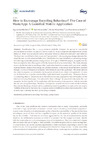Identificador persistente para citar o vincular este elemento:
https://accedacris.ulpgc.es/jspui/handle/10553/41517
| Title: | How to encourage recycling behaviour? The case of WasteApp: a gamified mobile application | Authors: | Aguiar Castillo, Lidia Rufo Torres, Julio De Saa Pérez, Petra Pérez Jiménez, Rafael |
UNESCO Clasification: | 33 Ciencias tecnológicas | Keywords: | Gamification Recycling WasteApp Gamipulation |
Issue Date: | 2018 | Journal: | Sustainability (Switzerland) | Abstract: | Gamification lies in using elements explicitly designed for games in non-playful environments to achieve the player's commitment and to encourage the development of specific behaviors. These tools can also be used as persuasion when it is intended to influence users' behavior. The boundary would be in what we can call "gamipulation"-the use of game-design elements that impel the user towards undesired behaviors. Gamification has been identified as a promising strategy for achieving sustainable practice among citizens. Through an H2020 EU project, an application has been developed to attain these goals within the framework of some tourist cities. This study attempts to evaluate the intention to use this gamified-application based on premises such as expected benefits, expected threats, technical knowledge, and personal features. A theoretical model has been validated through a survey of 79 experts in some pilot cities before the use of the application. The results showed that only the expected social benefits and the perceived risks have a direct and significant influence on the intention to adopt the sustainability application based on gamification. Moreover, there is a moderating effect of perceived risk on the relation between expected functional benefits and the intention of using WasteApp. It is noteworthy that, although the perceived risks make the user recognize the functionality of the application with less intensity, these perceived risks do not make the user stop usingWasteApp. Therefore, it is important to point out the implications derived from the study for the design of sustainability applications based on gamification, such as the need to give visibility of the user in the networks, to expose useful and difficult to obtain information from other sources, and to develop low-level game-design elements. | URI: | https://accedacris.ulpgc.es/handle/10553/41517 | ISSN: | 2071-1050 | DOI: | 10.3390/su10051544 | Source: | Sustainability [ISSN 2071-1050], v. 10 (5), article number 1544 | URL: | https://api.elsevier.com/content/abstract/scopus_id/85047009662 |
| Appears in Collections: | Artículos |
SCOPUSTM
Citations
49
checked on Jun 8, 2025
WEB OF SCIENCETM
Citations
36
checked on Feb 1, 2026
Page view(s) 1
1,288
checked on Jan 10, 2026
Download(s)
730
checked on Jan 10, 2026
Google ScholarTM
Check
Altmetric
Share
Export metadata
Items in accedaCRIS are protected by copyright, with all rights reserved, unless otherwise indicated.
